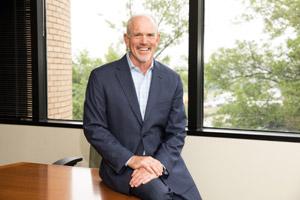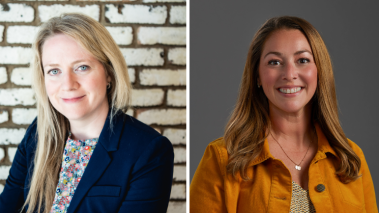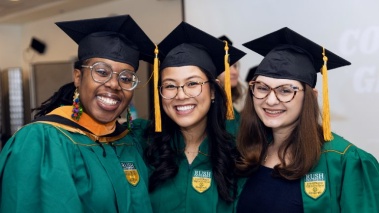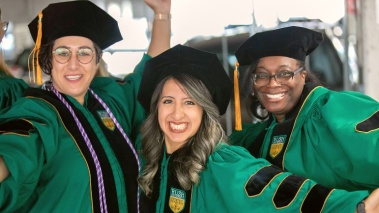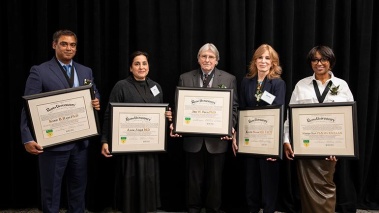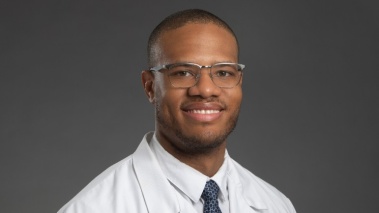It wasn’t in Paul Merrick’s plans to be a doctor.
“When I was a kid, I had zero intentions of going into medicine,” said Merrick, now president of DuPage Medical Group and chairman of its board of directors. “But then that sense of purpose and calling into the field evolves, and it sucks you in.”
The son of two hard-working parents, Merrick was heavily guided into the field by his father, Frank Merrick, who also served as a faculty member and physician at Rush. “He used to tell me that being a doctor is an ever-learning specialty, and you always have to continue to be a student,” said Merrick, who got his first taste of medicine in college as an emergency room assistant.
“I learned very quickly how intoxicating it is to help change the course of someone’s life, watching nurses and doctors help people in their time of need — that was the first time the hook was set.”
Paying it forward
Arriving on his first day at Rush, Merrick felt hesitant but inspired. “Truthfully, I was the last person accepted in my medical class and thought everyone was going to be smarter than I was,” said Merrick. “Rush made a bet on me, gave me a chance, and giving someone else that same chance is really important.”
And that’s exactly what Merrick did by establishing the Frank W. and Barbara J. Merrick Scholarship, in honor of his parents, to provide financial support to Rush Medical College students. With the average medical student graduating with more than $177,900 in debt, scholarships like these not only lessen the financial burden but ensure the most talented, qualified individuals get a chance to study and train at Rush.
“Because of my blessings at Rush, I feel a responsibility to lend other people a hand,” said Merrick, whose gift will provide half-tuition scholarships each year for the duration of a Rush student’s education. “I would have never made it to or through medical school without someone helping me.”
Keeping the Rush connection
Merrick will be the first to admit that Rush remains an interconnected part of his career, especially at DuPage Medical Group.
Since first taking his role in 2009, the group has grown from about 185 physicians to more than 750 — with a goal of reaching nearly 1,100 in the next three years. Of its employed physicians, one quarter of them have had some kind of Rush training in their careers. Carrying over the same sense of community, collaboration and relationship building he experienced at Rush, Merrick even recruited four of his own classmates to DuPage Medical Group.
“Whenever I see Rush on somebody’s resume, it’s an instant bond that helps create some connectedness and, therefore, trust and ability to work together,” said Merrick.
A vision for the future, today
DuPage Medical Group remains the largest independent, doctor-owned, doctor-directed organization in the country. Additionally, its accountable care organization, or ACO, for Medicare patients is the highest quality, lowest cost in Illinois — and in the top 10 percent nationally for quality and cost, based on the 2015 Medicare Shared Savings Program ACO Results.
“Rush has always kept clinical excellence a main focal point, making sure you do a great job at taking care of the patient first and foremost,” said Merrick. “That was instilled in me, and that’s become the cornerstone strategy of DuPage Medical Group as well.”
In fact, if all Chicago area patients who were reported in the 2015 MSSP Program ACO Results were treated with the same quality and efficient care of the group’s ACO, CMS might have saved nearly $1 billion.
“It’s a site of service strategy and clinical excellence, and there’s savings in doing the simple things that are efficient so you don’t have to deny care, and more people can get care for less money,” said Merrick. “We want to continue to put doctors in a position where we can solve problems.”
Merrick admits there is a real, natural affinity between what is being done at Rush to prepare for the future of health care and the work he’s doing in his own organization.
“We have a vision of what health care could and should look like, and it aligns well with what I’ve heard Larry Goodman talk about even 15 years ago,” said Merrick. “To have Rush’s fingerprint all over our success makes a ton of sense — and it’s probably no accident, because that’s where I learned so much.”

